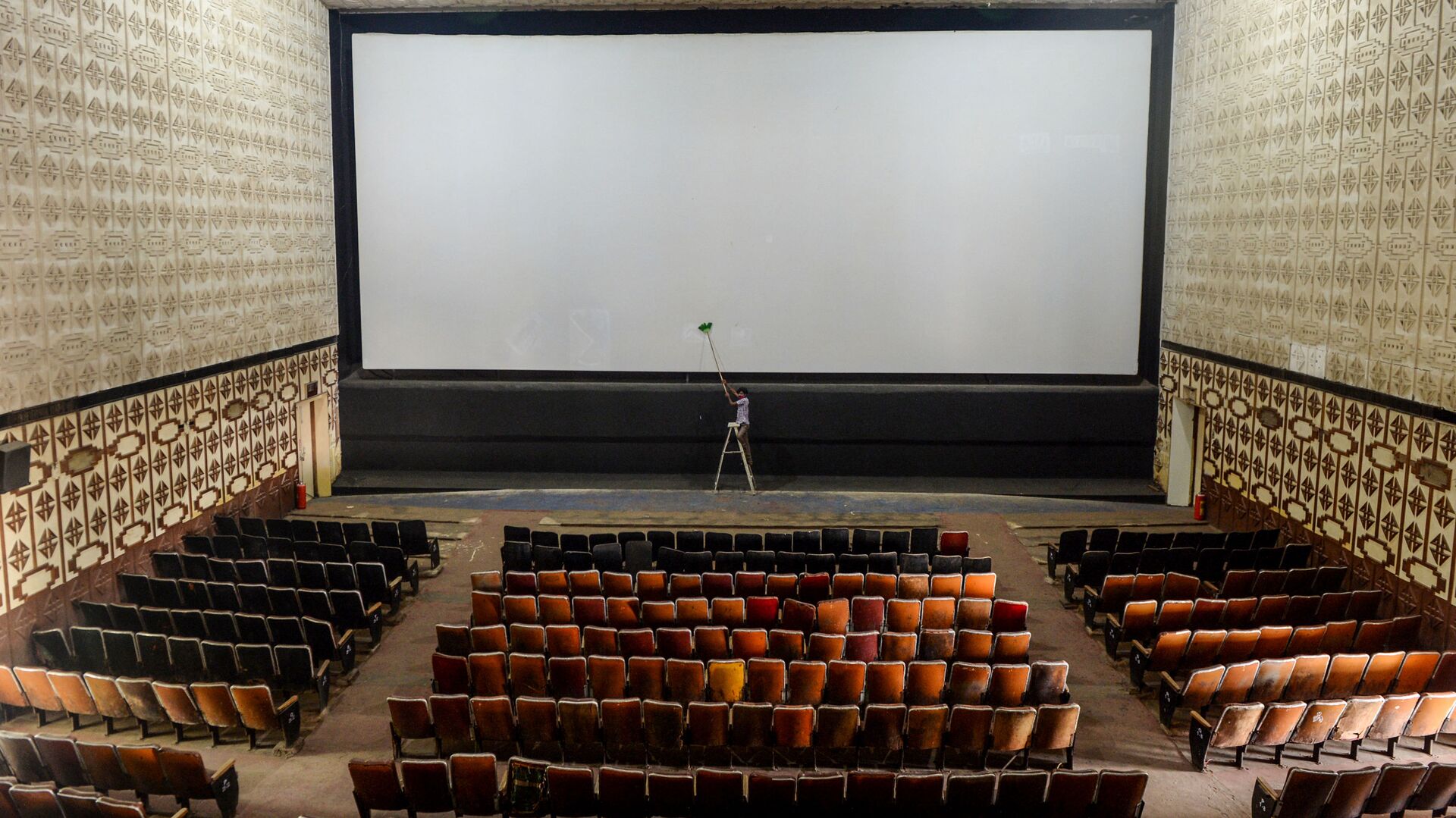https://sputnikglobe.com/20220304/indian-cinemas-on-road-to-recovery-after-157bln-revenue-hit-from-covid-says-pvr-cinemas-boss-1093583784.html
'Indian Cinemas on Road to Recovery After $1.57Bn Revenue Hit From COVID': Says PVR Cinemas Boss
'Indian Cinemas on Road to Recovery After $1.57Bn Revenue Hit From COVID': Says PVR Cinemas Boss
Sputnik International
The Cinema Exhibition Industry worldwide has been one of the worst-hit sectors by the COVID pandemic, having suffered the double whammy of zero income for... 04.03.2022, Sputnik International
2022-03-04T14:36+0000
2022-03-04T14:36+0000
2022-10-19T20:39+0000
cinema
cinema
movie
exhibition
revenue
filmmaker
bollywood
covid-19
life under covid-19 quarantine
delta variant of covid-19
https://cdn1.img.sputnikglobe.com/img/07e5/04/08/1082570990_0:304:3071:2031_1920x0_80_0_0_ec813184c784ed3bedb09330b05c1311.jpg
As India comes to the end of two years of COVID-19 outbreak that led to a nationwide lockdown from March 2020, Gautam Dutta, chief executive of one of India’s biggest multiplexes, PVR Cinemas, has told Sputnik about how the Cinema Exhibition industry, which has been one of the worst-hit sectors, is now reviving after a third wave of the pandemic.Sputnik: The cinemas are reopening after COVID. How is your business, PVR Cinemas, luring audiences back?Gautam Dutta: PVR launched a blockbuster movie month for February with an exhilarating Movie Trailer mash-up to alert customers to forthcoming films.The month of February saw some movie releases such as ‘Gangubai Kathiawadi’, ‘Badhaai Do’, ‘Death on the Nile’, ‘Moonfall’, ‘Marry Me’, ‘Uncharted’, ‘Valimai’, and ‘Bheemla Nayak’.Sputnik: How do you ensure everyone keeps safe from the virus in the enclosed space of your cinemas?Gautam Dutta: Apart from following standard safety protocols laid down by the government, we’ve deployed a revolutionary technology through negative ion generator devices that provide real-time indoor air sterilisation, offering protection against all kinds of harmful bacteria, viruses, and microbes in the air and on surfaces.For those, who don’t feel safe watching movies in an enclosed space, we’ve launched India’s first Rooftop Drive-in Theatre at Jio World Drive in Mumbai city, bringing back the nostalgia of watching films under the stars from the comfort of your car.Sputnik: When can we hope to have a full house and audiences watching movies without social distancing?Gautam Dutta: Cinemas will peak again only when we are allowed to operate at our maximum capacity without any restrictions.After the second COVID wave in July 2021, cinemas received a good flow of Hollywood and Bollywood films screening in cinemas. Restrictions such as variable seating capacity restrictions, limited operating hours, weekend closures, vaccination status of employees and guests became a new norm.The third-quarter of the year (October to December) saw the release of Bollywood films spearheaded by big blockbusters ‘Sooryanvanshi', ’83’ and others which revived cinema-going habits.This was aided by big-ticket Hollywood films such as ‘No Time to Die’, ‘Spiderman: No Way Home’ and ‘Eternals’, and regional Indian films such as ‘Pushpa: The Rise’, ‘Annaatthe’, ‘Border’ and ‘Maanaadu’.The big screen was back in the doldrums when the third wave of omicron struck in January 2022, slowing the momentum of growth, with all the big-ticket films postponed and footfall affected yet again.Sputnik: How did the omicron third wave affect the cinema business in India?Gautam Dutta: It was a brief intermission for the cinemas. Because it was less severe, cinemas were ordered to shut down temporarily in India’s capital city Delhi and Haryana state, and reopened after a month as the pandemic started to disperse.Sputnik: How much loss did India’s film exhibition industry face in these two years because of the COVID-19 pandemic?Gautam Dutta: The Cinema Exhibition Industry has been one of the worst-hit sectors affected by COVID-19. The first and second waves of pandemics had brought uncertainties and unprecedented challenges for both employees and the entire multiplex industry.Thousands of screens countrywide were forced to close down, and many employees, not just of cinemas, but even their supply chains and other stakeholders, faced personal hardship.The film exhibition industry directly employs more than 200,000 people while providing indirect employment to thousands of others who bore the brunt of these massive losses because of several rounds of lockdown in the country.Sputnik: Some people avoid going to the multiplexes as they think it’s not safe since a lot of people congregate in them. What’s your take on this?Gautam Dutta: It’s a big misconception. Many international scientific studies have confirmed that there is a very low risk of COVID-19 transmission in the cinemas, where customers are - for the vast majority of the time - sitting, facing the same direction, wearing masks and not talking.The Multiplex Association of India has been lobbying various state governments with a study that not a single outbreak of COVID-19 in the world has been traced to a cinema and that cinemas should be treated in the same way as comparable industries and institutions.After being allowed to reopen, cinemas have already demonstrated an ability to operate safely for the public and employees via the use of enhanced ventilation systems, enhanced hygiene, and other safety protocols.Sputnik: What releases are expected?Gautam Dutta: Continuing the momentum generated in February and March, there are some great movies due for release. This includes Bollywood movies such as ‘Jhund’ starring megastar Amitabh Bachchan, ‘Bachchan Pandey’ starring Akshay Kumar, ‘Bhool Bhulaiyaa 2’ starring Kartik Aryaan.There is Hollywood’s ‘Batman’ starring Robert Pattinson, Oscar-nominated ‘King Richard’ starring Will Smith, and ‘The Lost City’ with Sandra Bullock and Brad Pitt.From India's regional industry, there is ‘Radhe Shyam’ starring Prabhas Vikramaditya, and ‘RRR’ from filmmaker Koduri Srisalla Sri Rajamouli who has already wowed audiences with his 'Baahubali'.
hollywood
Sputnik International
feedback@sputniknews.com
+74956456601
MIA „Rosiya Segodnya“
2022
Sangeeta Yadav
https://cdn1.img.sputnikglobe.com/img/07e4/08/1b/1080292803_0:121:960:1081_100x100_80_0_0_7490b319dab9611e309056b177265184.jpg
Sangeeta Yadav
https://cdn1.img.sputnikglobe.com/img/07e4/08/1b/1080292803_0:121:960:1081_100x100_80_0_0_7490b319dab9611e309056b177265184.jpg
News
en_EN
Sputnik International
feedback@sputniknews.com
+74956456601
MIA „Rosiya Segodnya“
Sputnik International
feedback@sputniknews.com
+74956456601
MIA „Rosiya Segodnya“
Sangeeta Yadav
https://cdn1.img.sputnikglobe.com/img/07e4/08/1b/1080292803_0:121:960:1081_100x100_80_0_0_7490b319dab9611e309056b177265184.jpg
cinema, cinema, movie, exhibition, revenue, filmmaker, bollywood, covid-19, life under covid-19 quarantine, delta variant of covid-19, global covid-19 cases spike to highest level post-lockdown, countries ease lockdown measures while covid-19 cases surpass 4 mln worldwide, hollywood
cinema, cinema, movie, exhibition, revenue, filmmaker, bollywood, covid-19, life under covid-19 quarantine, delta variant of covid-19, global covid-19 cases spike to highest level post-lockdown, countries ease lockdown measures while covid-19 cases surpass 4 mln worldwide, hollywood
'Indian Cinemas on Road to Recovery After $1.57Bn Revenue Hit From COVID': Says PVR Cinemas Boss
14:36 GMT 04.03.2022 (Updated: 20:39 GMT 19.10.2022) The Cinema Exhibition Industry worldwide has been one of the worst-hit sectors by the COVID pandemic, having suffered the double whammy of zero income for cinemas across India which were forced to close for months because of the lockdown, and thousands of staff losing their job because the venues were shut.
As India comes to the end of two years of COVID-19 outbreak that led to a nationwide lockdown from March 2020, Gautam Dutta, chief executive of one of India’s biggest multiplexes, PVR Cinemas, has told Sputnik about how the Cinema Exhibition industry, which has been one of the worst-hit sectors, is now reviving after a third wave of the pandemic.
Sputnik: The cinemas are reopening after COVID. How is your business, PVR Cinemas, luring audiences back?
Gautam Dutta: PVR launched a blockbuster movie month for February with an exhilarating Movie Trailer mash-up to alert customers to forthcoming films.
The month of February saw some movie releases such as ‘Gangubai Kathiawadi’, ‘Badhaai Do’, ‘Death on the Nile’, ‘Moonfall’, ‘Marry Me’, ‘Uncharted’, ‘Valimai’, and ‘Bheemla Nayak’.
Armed with this cornucopia of back-to-back films extending to March and beyond, we expect moviegoers to resume their big-screen experience after a short gap.
Sputnik: How do you ensure everyone keeps safe from the virus in the enclosed space of your cinemas?
Gautam Dutta: Apart from following standard safety protocols laid down by the government, we’ve deployed a revolutionary technology through negative ion generator devices that provide real-time indoor air sterilisation, offering protection against all kinds of harmful bacteria, viruses, and microbes in the air and on surfaces.
For those, who don’t feel safe watching movies in an enclosed space, we’ve launched India’s first Rooftop Drive-in Theatre at Jio World Drive in Mumbai city, bringing back the nostalgia of watching films under the stars from the comfort of your car.
Sputnik: When can we hope to have a full house and audiences watching movies without social distancing?
Gautam Dutta: Cinemas will peak again only when we are allowed to operate at our maximum capacity without any restrictions.
Around 10 states and two union territories in our PVR circuit have eased restrictions in operating hours and seating capacity and operate at 100 percent seating capacity. Other states continue to operate at 50 to 75 percent seating capacity but we expect more relaxations in the near future.
After the second COVID wave in July 2021, cinemas received a good flow of Hollywood and Bollywood films screening in cinemas. Restrictions such as variable seating capacity restrictions, limited operating hours, weekend closures, vaccination status of employees and guests became a new norm.
The third-quarter of the year (October to December) saw the release of Bollywood films spearheaded by big blockbusters ‘Sooryanvanshi', ’83’ and others which revived cinema-going habits.
This was aided by big-ticket Hollywood films such as ‘No Time to Die’, ‘Spiderman: No Way Home’ and ‘Eternals’, and regional Indian films such as ‘Pushpa: The Rise’, ‘Annaatthe’, ‘Border’ and ‘Maanaadu’.
The big screen was back in the doldrums when the third wave of omicron struck in January 2022, slowing the momentum of growth, with all the big-ticket films postponed and footfall affected yet again.
Sputnik: How did the omicron third wave affect the cinema business in India?
Gautam Dutta: It was a brief intermission for the cinemas. Because it was less severe, cinemas were ordered to shut down temporarily in India’s capital city Delhi and Haryana state, and reopened after a month as the pandemic started to disperse.
The shutdown in Delhi and Haryana shook the confidence of big-ticket movie producers who had already announced the release dates of their films after the second wave. They chose to push their release dates further, waiting for restrictions to ease.
Sputnik: How much loss did India’s film exhibition industry face in these two years because of the COVID-19 pandemic?
Gautam Dutta: The Cinema Exhibition Industry has been one of the worst-hit sectors affected by COVID-19. The first and second waves of pandemics had brought uncertainties and unprecedented challenges for both employees and the entire multiplex industry.
Thousands of screens countrywide were forced to close down, and many employees, not just of cinemas, but even their supply chains and other stakeholders, faced personal hardship.
It is estimated that the Indian cinema exhibition industry had lost theatrical revenues of close to INR120 billion ($1.57 billion) gross box-office collection (GBOC) in the 2020-21 financial year.
The film exhibition industry directly employs more than 200,000 people while providing indirect employment to thousands of others who bore the brunt of these massive losses because of several rounds of lockdown in the country.
Sputnik: Some people avoid going to the multiplexes as they think it’s not safe since a lot of people congregate in them. What’s your take on this?
Gautam Dutta: It’s a big misconception. Many international scientific studies have confirmed that there is a very low risk of COVID-19 transmission in the cinemas, where customers are - for the vast majority of the time - sitting, facing the same direction, wearing masks and not talking.
Countries such as the US, UK, France, Germany, China, Korea, Italy, Spain, UAE, Singapore, Malaysia, etc, continue to operate cinemas, with the introduction of the highest safety protocols.
The Multiplex Association of India has been lobbying various state governments with a study that not a single outbreak of COVID-19 in the world has been traced to a cinema and that cinemas should be treated in the same way as comparable industries and institutions.
After being allowed to reopen, cinemas have already demonstrated an ability to operate safely for the public and employees via the use of enhanced ventilation systems, enhanced hygiene, and other safety protocols.
Sputnik: What releases are expected?
Gautam Dutta: Continuing the momentum generated in February and March, there are some great movies due for release. This includes Bollywood movies such as ‘Jhund’ starring megastar Amitabh Bachchan, ‘Bachchan Pandey’ starring Akshay Kumar, ‘Bhool Bhulaiyaa 2’ starring Kartik Aryaan.
There is Hollywood’s ‘Batman’ starring Robert Pattinson, Oscar-nominated ‘King Richard’ starring Will Smith, and ‘The Lost City’ with Sandra Bullock and Brad Pitt.
From India's regional industry, there is ‘Radhe Shyam’ starring Prabhas Vikramaditya, and ‘RRR’ from filmmaker Koduri Srisalla Sri Rajamouli who has already wowed audiences with his 'Baahubali'.
We are optimistic about the strong comeback of the cinema exhibition sector and hoping that 2023 will be the biggest year for the film industry with the kind of content line-up we have.





